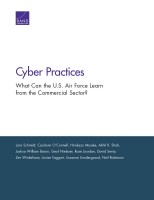| 来源类型 | Research Reports
|
| 规范类型 | 报告
|
| ISBN | 9780833090324
|
| 来源ID | RR-847-AF
|
| Cyber Practices: What Can the U.S. Air Force Learn from the Commercial Sector? |
| Lara Schmidt; Caolionn O'Connell; Hirokazu Miyake; Akhil R. Shah; Joshua Baron; Geof Nieboer; Rose Jourdan; David Senty; Zev Winkelman; Louise Taggart; et al.
|
| 发表日期 | 2015
|
| 出版年 | 2015
|
| 页码 | 108
|
| 语种 | 英语
|
| 结论 |
Information Technology (IT) and Information Security Should Be Managed as Two Separate Disciplines- Treating the disciplines separately would increase effectiveness and efficiency.
- Reductions in the size of the cyber workforce might result.
IT Should Remain a Critical Core Function- Despite a trend toward outsourcing, USAF must retain some redundancies to ensure that it can deliver services in cyber-contested warfighting environments at operating locations around the world.
- USAF might be able to find efficiencies above current levels by applying consolidation of IT capabilities to the extent possible.
- On average, companies maintained approximately 20 times more IT personnel than information security personnel. Given this standard, USAF should consider a cyber manpower review, as its information security workforce is smaller than one might expect based on commercial practices.
Technical Depth of Cyber Leadership Should Be Valued and Cultivated- Managing IT and information security as two separate disciples increases the technical depth of individuals in those fields.
- There is opportunity for gradually developing the breadth required for senior positions by using an approach that still reinforces technical depth.
- Encouraging technical depth in the officer corps need not be in conflict with USAF promotion and career field management practices.
|
| 摘要 |
- USAF should align career fields with either IT or information security, since these are different disciplines that require different management and training approaches.
- Increase the size of the USAF information security workforce. Commercial practice should be considered a lower bound for USAF force structure planning assessments.
- Improve the accession of cyber-capable personnel by looking for candidates with relevant degrees from universities with noted cyber programs and establishing aptitude tests.
- Structure organizations, including cyber squadrons, according to the guidelines laid out in organizational theory and consolidate the management of these organizations to the greatest extent possible to achieve efficiencies.
- USAF should approach outsourcing, whether to contractors or other government providers, in a way that bolsters the expertise of USAF cyber personnel, as opposed to replacing the need for it.
|
| 主题 | Cybercrime
; Cybersecurity
; Military Information Technology Systems
; Occupations
; United States Air Force
; Workforce Management
|
| URL | https://www.rand.org/pubs/research_reports/RR847.html
|
| 来源智库 | RAND Corporation (United States)
|
| 资源类型 | 智库出版物
|
| 条目标识符 | http://119.78.100.153/handle/2XGU8XDN/108086
|
推荐引用方式
GB/T 7714 |
Lara Schmidt,Caolionn O'Connell,Hirokazu Miyake,et al. Cyber Practices: What Can the U.S. Air Force Learn from the Commercial Sector?. 2015.
|
|
文件名:
|
x1495316336667.jpg
|
|
格式:
|
JPEG
|

|
文件名:
|
RAND_RR847.pdf
|
|
格式:
|
Adobe PDF
|
除非特别说明,本系统中所有内容都受版权保护,并保留所有权利。